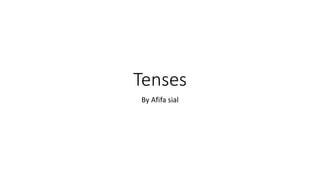
present indefinite tense.pptx
- 2. What do you mean by tenses ? Tenses demonstrate the time of an action in a sentence usually performed by or centered around the subject of the sentence. The actions are called verbs. Verbs change according to tenses and other issues. As verbs are the most important elements of English sentences, tenses also carry paramount importance in English grammar. Tenses are mainly categorized into three types. 1. Present Tense 2. Past Tense 3. Future Tense
- 3. Present Tense Each of the types of tenses has four different forms. •Present Indefinite Tense •Present Progressive (Continuous) Tense •Present Perfect Tense •Present Perfect Progressive (Continuous) •Present Indefinite Tense The present indefinite tense, also known as simple present tense, denotes a stative or habitual or eternally true action. Generally simple present tense is used to indicate an action which happens – always, regularly, every day, daily, normally, generally, usually, occasionally, sometimes, often, rarely, frequently, nowadays, naturally, seldom, constantly, never, every a week, every year, once a year, on a week, at times, at present, now and then, or all the time. Structure: Subject (third person singular number) + verb in simple present form + s/es + . . . . . Subject (all other kinds) + verb in simple present form + . . . . . Note: When ‘be’ verbs work as the main verb in a sentence, they are different from the above structures.
- 4. Person/ number Singular Plural First person I am a good cricket player. We are good cricket players. Second person You are an irresponsible person. You all are always irresponsible Third person The earth is smaller than Jupiter. Junk foods are not good for health.
- 5. There are some stative verbs which are usually used in simple tenses whether present or past or future. The stative verbs are: Have,Understand,Know,Believe,Hate,Need,Hear,Love,Appear,See,Like,s eem,Smell,Want,Taste,Wish,Sound,Own
- 6. Examples: •I know Billy Bob. •He understands it. •They love swinging in the park. •Some people do not believe in God. •I usually wake up at 6.00 AM. •He plays cricket, but his brother plays football. •Earth is bigger than Mercury. •The heat of the sun is the least in the polar